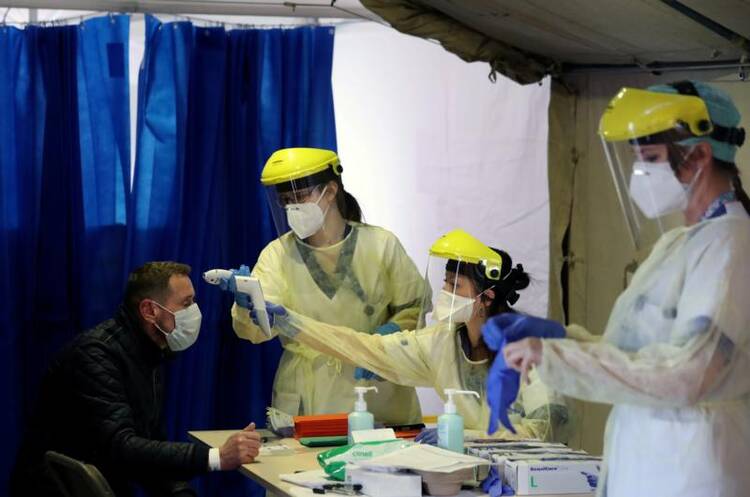OXFORD, England (CNS) -- The Commission of Bishops' Conferences of the European Union has urged member-states to stop "capitulating to fear and nationalism" during the COVID-19 pandemic, as Catholic aid groups demanded governments commit to a "healthier and more equitable future."
The Brussels-based COMECE, headed by Cardinal Jean-Claude Hollerich of Luxembourg, noted the increase in actions of mutual support among European nations but warned EU countries to reaffirm their "shared European responsibility," by jointly caring for the sick and exchanging medical materials, as well as helping ease "social, economic and financial shocks" and reinforcing international cooperation.
"We gratefully commend the numerous policy actions of mutual support and encourage political decision-makers in the EU and its member-states to continue acting in a determined, transparent, empathic and democratic way."
In an April 2 statement with the non-Catholic Conference of European Churches, COMECE said: "This is the time for all of us to demonstrate our joint commitment to the European project and to common European values of solidarity and unity, instead of capitulating to fear and nationalism."
"Let us regard this time of trial also as a time of grace and hope. Let us remain united and make our closeness felt to all, especially those in need."
European politicians have criticized the EU for lacking coordination against the COVID-19 pandemic, which had caused tens of thousands of deaths across the trading bloc.
In a March 24 Vatican Radio interview, Cardinal Hollerich said solidarity was essential "above all in dramatic moments," and said many EU countries violated Christian values by "blocking their borders and making decisions only for their own people's benefit without regard for others."
Two Vatican pontifical academies also condemned the "selfishness and shortsightedness of uncoordinated national responses" in a March 20 statement and warned against "seeking protection through isolationism."
Meanwhile, the Brussels-based CIDSE, a consortium of Catholic aid groups from Europe and North America, warned that choices being made now would shape society "for years, if not decades, to come."
"This is a time to be decisive in saving lives and bold in charting a path to a genuinely healthier and more equitable future through a just recovery," said the open letter, also signed by the Global Catholic Climate Movement, Jesuit Centre for Faith and Justice and more than 200 ecology and human rights groups.
"As decision-makers take steps to ensure immediate relief and long-term recovery, it is imperative they consider the interrelated crises of wealth inequality, racism and ecological decline -- notably the climate crisis -- which were in place long before COVID-19 and now risk being intensified."
The appeal urged governments to "put people's health first" and "provide economic relief directly to the people," as well as creating "millions of decent jobs" and ensuring "resilience for future crises."
"Build solidarity and community across borders -- don't empower authoritarians," the document said. "Assistance directed at specific industries must be channeled to communities and workers, not shareholders or corporate executives."
Caritas Internationalis, made up of 165 Catholic relief, development and social service agencies working in almost 200 countries, was mobilizing to help countries suffering due to the pandemic. Most of the member agencies are relief and development agencies sponsored by national bishops' conferences, such as the U.S.-based Catholic Relief Services or Canada's Development and Peace.
In a videoconference with journalists April 3, Aloysius John, secretary general, said that in Italy, one of the countries hardest hit by the pandemic, Caritas has continued operating soup kitchens and shelters for the homeless as well as helping the elderly through a telephone hotline.
He also said similar initiatives were being mobilized in Armenia, Uganda and Ukraine.
Nevertheless, Caritas' "main concern today is to prepare the poorer countries in Africa, Asia, Latin America and the Middle East, to confront such massive emergency due to a sudden outbreak of the pandemic," John said.
"The human suffering should unite us," John told journalists. "We have a role to play, and this what we are doing, we are trying to be in solidarity with the church, and we are also getting this message across to the people here, saying that there are also people suffering with this situation. Now we know what suffering means, and I think that should bring us to more solidarity."










